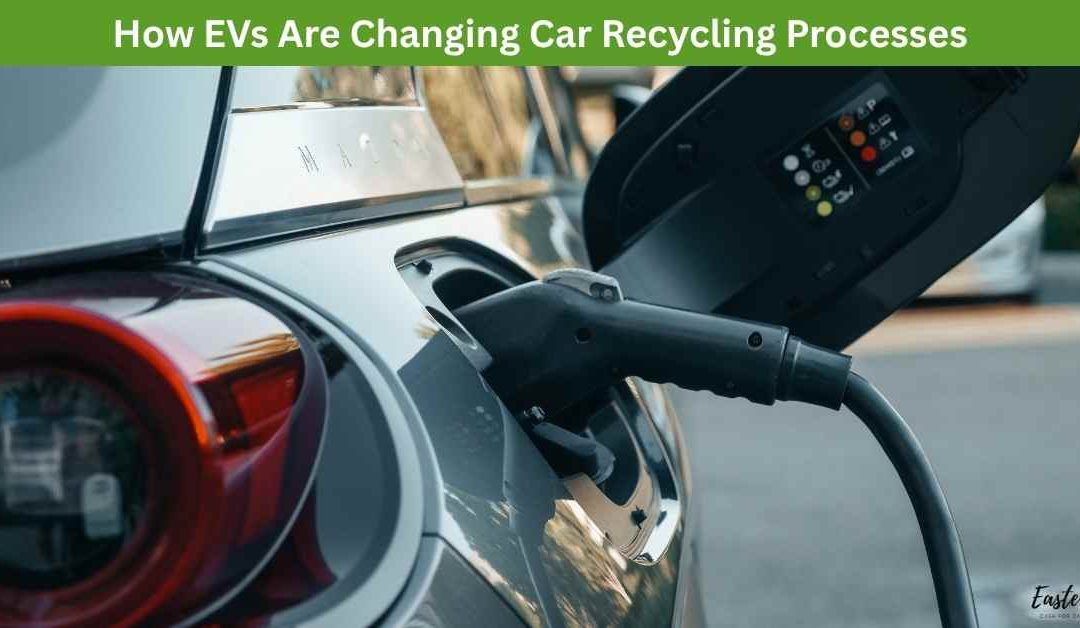Electric vehicles (EVs) are no longer a rare sight on Australian roads. With more people choosing EVs for their efficiency, lower running costs, and environmental benefits, the automotive landscape is shifting fast. But alongside the rise of electric cars, there’s also an important transformation happening behind the scenes—particularly in how vehicles are recycled.
Recycling EVs isn’t quite the same as scrapping a traditional petrol or diesel car. The batteries, electric motors, and advanced electronics present new challenges and opportunities for the industry. Let’s take a closer look at how EVs are changing car recycling processes in Australia.
The Key Differences Between EVs and Conventional Cars
First, it’s important to understand what makes EVs unique from a recycling perspective:
- High-voltage battery packs – These large lithium-ion battery systems are heavier and more complex than standard car batteries. They require careful handling to prevent fires or chemical leaks.
- Electric motors and controllers – Unlike combustion engines, EVs use electric motors that need specialised dismantling and recycling.
- Advanced electronics – EVs include sophisticated sensors, software, and control units that often contain rare metals.
- Lightweight materials – Many EVs use aluminium and composites to reduce weight, which need different recycling methods than steel.
These differences mean traditional car recycling techniques need to adapt.
Battery Handling and Recycling: The Biggest Shift
The EV battery pack is the most significant factor changing the recycling game. These packs contain hundreds of individual cells and store a large amount of energy, so they can be hazardous if not dealt with properly.
Recycling centres now require specialised equipment and trained technicians to:
- Safely deactivate and remove batteries from vehicles
- Transport batteries in compliance with strict safety regulations
- Extract valuable materials like lithium, cobalt, nickel, and manganese from spent cells
Currently, Australia is developing better battery recycling infrastructure to keep up with EV growth. Companies such as Envirostream and Lithion Recycling are pioneering processes that can recover up to 95% of the materials in EV batteries, reducing the need for mining new resources.
Reuse and Repurposing Opportunities
Not all EV batteries are scrapped immediately after removal. Some still retain enough capacity to be repurposed for less demanding applications—like energy storage for homes or businesses.
This secondary use extends the life of battery packs and reduces waste. It also creates new business opportunities in the recycling and renewable energy sectors.
Electric Motors and Components: New Salvage Markets
EV motors and controllers differ from petrol engines, but they still have good value. Many wreckers now focus on salvaging:
- Electric motors for reuse or resale
- Power electronics such as inverters and converters
- Charging components and cables
As EV adoption increases, the demand for these parts is expected to grow. This is creating new salvage markets and encouraging recyclers to invest in EV-specific dismantling skills.
Environmentally Friendly Materials and Lightweight Construction
EVs often use more aluminium and lightweight composites to improve efficiency. Aluminium recycling requires different processes than steel, but it’s highly valuable.
Recyclers are investing in updated machinery and techniques to handle these materials effectively. Recovering aluminium not only saves resources but also reduces the environmental footprint of vehicle manufacturing.
Challenges Recycling EVs Pose
While EV recycling offers great opportunities, it also brings challenges:
- Safety risks – Lithium-ion batteries can catch fire if damaged or improperly handled. Recycling centres need strict safety protocols.
- Cost and complexity – Battery recycling can be expensive and technically demanding. Scaling up operations is essential for cost-effectiveness.
- Regulation and standards – Australia is still developing comprehensive EV recycling regulations and standards, though progress is ongoing.
Despite these challenges, the industry is evolving quickly to meet demand.
What Does This Mean for Australian Car Owners?
For everyday EV owners, this shift in recycling means:
- Responsible disposal and recycling options will become more widely available.
- Cash-for-cars services will increasingly handle EVs safely and efficiently.
- Selling your EV at end-of-life will remain a straightforward process, even if the vehicle isn’t roadworthy.
If you’re thinking about selling your electric car, look for recyclers and buyers experienced in EVs to ensure proper handling and the best price.
A Real Example From Our Experience
We recently handled the removal of a 2016 Tesla Model S from a customer in Melbourne. The vehicle had battery issues and was no longer driving reliably.
Our trained technicians safely removed the battery pack and prepared the car for dismantling. The battery was sent to a certified recycler specialising in lithium-ion cells, while other parts like the electric motor and aluminium body panels were salvaged for resale.
The customer received a competitive offer and free pickup, with peace of mind that their EV was recycled responsibly.
The Future of Car Recycling Is Electric
As electric vehicles become the norm, the car recycling industry is adapting rapidly. From battery recycling to new salvage techniques, the whole process is evolving to be safer, more efficient, and better for the environment.
If you own an EV that’s no longer roadworthy or want to upgrade, rest assured that modern recycling services are ready to handle your vehicle responsibly and pay you fairly.
Electric cars are changing the road—and they’re changing how we think about car recycling too.
If you have an electric vehicle you want to sell or recycle, get in touch with us today for a free quote and expert service.
If you are in Oakleigh, and looking to sell your car or get cash for trucks, below is the best way to visit us.
Eastern Cash For Cars
720 High St Rd, Glen Waverley, VIC 3150
(03) 7035 7830
www.easterncashforcars.com.au


Recent Comments